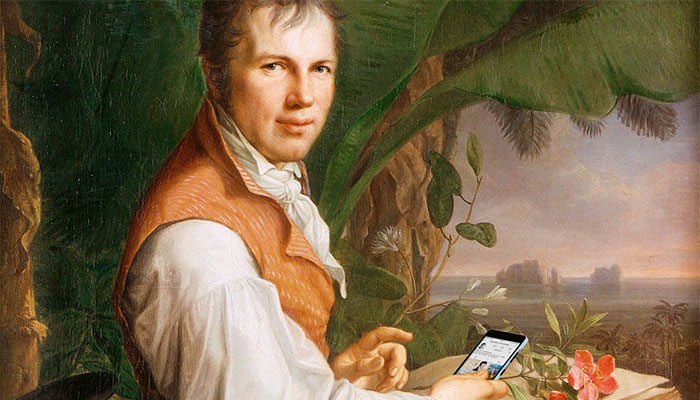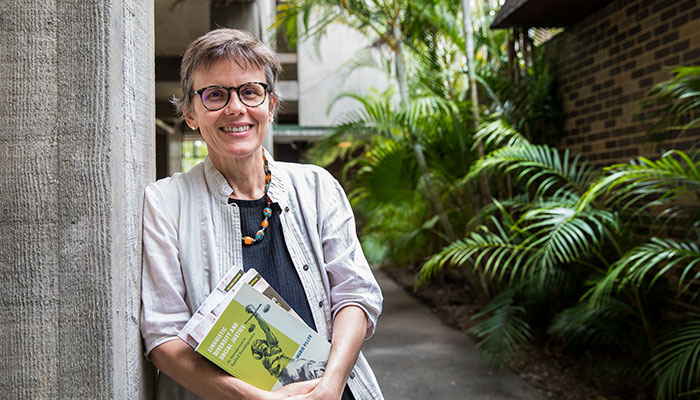The network of Humboldtians is an international one of more than 29,000 scientists and scholars from all academic disciplines and more than 140 countries. Some say they are mysterious, but it’s really quite simple: what lies at the heart of the prestigious epithet is research excellence.

Polymath scholar: Alexander von Humboldt, portrait by Friedrich Georg Weitsch, 1806 (Staatliche Museen zu Berlin, Nationalgalerie / Photographer: Karin März / Montage: Raufeld Medien).
Fifty-five of their number are Nobel Prize winners – people such as physicist Steven Chu, who served as energy secretary in the Obama Government. From Egypt to Australia, India to the USA, they are committed to the goals of freedom, peace and a good life for all.
They are called Humboldtians because the Humboldt Foundation – endowed by the German government to promote academic co-operation and exchange – has recognised the excellence and impact of their research with generous grants and awards that allow them to further pursue their research in collaboration with German universities and mentors.
The foundation’s namesake is eminent German polymath Alexander von Humboldt (1769-1859), a scholar of the Enlightenment era who was a geographer, naturalist, explorer and proponent of Romantic philosophy and science.
Among many achievements, he is credited with being the first scientist to write about man-made climate change following an expedition to Latin America, where he observed the impact of monoculture plantations on local water tables.
The lost link between poetry and nature
“Humboldt was an interdisciplinary person who believed that in order to discover anything new you have to have a very broad education and understanding,” says Piller, who received the Humboldt Foundation’s €250,000 Anneliese Maier Award in 2018 in recognition and support of her research into multilingualism and language learning in migrant societies.
If you look at climate change for instance, we need the scientists, but we also need the economists, the entrepreneurs, the humanities and indigenous knowledges.
“For him, the separation that we now have between the natural sciences and the humanities didn’t exist at all.”
Humboldt was “very much into poetry as a way of understanding nature”, Piller says, and had a close friendship with Johann Wolfgang von Goethe, the German Shakespeare, who was not only a poet but had strong research interests in natural sciences and wrote treatises about optics and colour perception.
“So both of these men were real believers of interdisciplinary collaboration and the holistic view of knowledge that doesn’t break it up into the sciences and the humanities.” Piller explains. “As well as living that as individuals, they also strongly believed in the advantages of working together.”
Why humanity needs Humboldt today
Piller says Humboldt’s approach to knowledge and collaboration is more relevant than ever as humanity grapples with serious issues such as mass migration and climate change, which cannot be solved by one area of expertise alone.

More relevant than ever: Humboldtian scholar and Distinguished Professor of Applied Linguistics Ingrid Piller says solving the world's big problems needs an interdisciplinary approach pioneered by the German polymath.
“What does migration mean, how does it change a society? Global warming; the sustainability of the planet … these are all really, really big problems that you can’t just solve with one discipline,” Piller says.
“If you look at climate change for instance, we need the scientists, but we also need the economists, the entrepreneurs, the humanities and indigenous knowledges.
“We need all kinds of approaches together to solve these big problems and so that really is evidence for the fact that Humboldt is more relevant than ever, at a time when knowledge has become ever more fragmented and everyone lives in their silos and is very, very specialised.”
From antibiotic resistance to Mongolian costume
Humboldt, Piller says, was one of the first people to organise an academic conference, bringing researchers from across Europe together in Berlin in the early 19th century, a time when travel was still a challenge, to talk about their research.
In the Humboldtian spirit, this weekend’s Biennial Symposium of the Australian and New Zealand Associations of von Humboldt Fellows will feature speakers from across the disciplines, mirroring the academic diversity of those who will be attending the conference.
The research topics being presented by the speakers are correspondingly broad, for instance: juvenile people smugglers from Indonesia; vaccine misinformation on social media; antibiotic resistance; a new paradigm for nuclear structure; and Mongolian costumes and symbols in contemporary Inner Mongolia.
- Designer bacteria could fuel the future with cheap hydrogen
- Shakespeare's English? Five ways you're speaking it daily
“What is fantastic about the Humboldt network is it provides venues like this conference where you can completely interact outside your speciality, so it’s a great opportunity to overcome the silos,” Piller says.
“The interdisciplinary exchange is really important, and again for an academic conference that is highly unusual.”
It’s not enough to just discover something new ... and then no one ever knows about it. We are still funding universitites to produce knowledge and that knowledge needs to be shared to be meaningful.
Humboldt was not only a pioneering researcher, explorer and thinker but also an extraordinary research communicator.
In line with its theme, Sharing Knowledge in the Spirit of Humboldt, the symposium will also address the challenges of communication in the social media age, and how researchers can get their messages out.
“If you do research, it’s not enough to just discover something new for yourself or your disciplines and then no one ever knows about it,” Piller says.
“We are still funding universities to produce knowledge, and that knowledge needs to be shared to be meaningful.”
LIVE TWITTER: The symposium will be live-tweeted under the hashtag #AvHMQ. So if you can’t attend in person, you can still participate on Twitter.
Ingrid Piller is Distinguished Professor of Applied Linguistics at Macquarie University’s Department of Linguistics.



